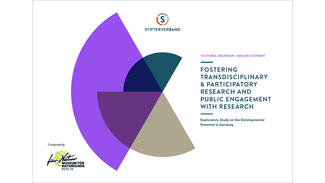
Fostering Transdisciplinary & Participatory Research and Public Engagement with Research
Exploratory Study on the Developmental Potential in Germany

The major challenges of our time – from the climate crisis and digital transformation to societal polarisation – cannot be addressed from isolated perspectives. Research is increasingly expected not only to generate new knowledge but also to contribute actively to tackling societal transformation.
This exploratory study published in November 2025, commissioned by the Stifterverband, demonstrates how transdisciplinary and participatory research as well as public engagement with research can bring science and society closer together — and identifies the structural conditions required to enable such collaboration.
In recent years, the policy and research discourse has been shifting – from research for society to research with society. Numerous national and international frameworks – from UNESCO and the European Commission to the Federal Ministry for Education, Technology and Research (BMFTR) – highlight the importance of participation, openness, and societal relevance in scientific work.
Against this backdrop, the Museum für Naturkunde Berlin and the Berlin School of Public Engagement and Open Science conducted this exploratory study on behalf of the Stifterverband. The study examines how the above mentioned principles are being implemented in the German research landscape, where funding mechanisms and incentives are working effectively – and where gaps remain.
Aim of the Study
The study investigates how transdisciplinary and participatory research and public engagement (TPPE) can be systematically supported, institutionally embedded, and culturally strengthened in Germany. Through an analysis of strategies, key actors, organisational models, and case studies, it explores:
- how policy and institutional frameworks can be shaped to foster research with society,
- which structures within universities and research institutions enable long-term integration,
- and how researchers can be supported to recognise, integrate and incentivise societal relevance as an integral part of scientific quality.
The study thus provides a positioning – showing what is already working well, what remains underdeveloped, and where the greatest potential lies for building a research system that is socially effective and democratically grounded.
Key Findings
The study combines empirical analyses, in-depth case studies, and strategic recommendations to provide a comprehensive picture of how TPPE is currently promoted in Germany.
Current Practice and Structural Conditions
A nationwide online survey and interviews with key stakeholders from research, policy, and funding institutions reveal a growing willingness and capability to engage in participatory and transdisciplinary research.
- Yet, much of this work remains fragmented, short-term, and dependent on individual commitment.
- Persistent challenges include a lack of stable structures, long-term funding mechanisms, and recognised evaluation standards.
- The analysis highlights that many programmes and institutional responsibilities remain siloed and inconsistently coordinated, which limits sustainable impact and cultural embedding.
Institutional Models and Practice Examples
Five case studies illustrate how structural embedding can succeed:
- The UK National Coordinating Centre for Public Engagement (NCCPE) demonstrates how sector-wide coordination and culture change can be achieved.
- The Technical University of Munich and the University of Tübingen show how TPPE can be anchored in university strategies, teaching, and management.
- Fraunhofer MEVIS and Wissenschaftsladen (WILA) Bonn exemplify how non-university institutions develop lasting participatory models through networks, partnerships, and creative formats.
Recommendations for Policy and Institutions
Based on empirical insights, the study formulates actionable recommendations:
- It calls for systemically coordinated funding structures that are cross-ministerial and address all stages of the research process.
- It also advocates for revised evaluation and incentive systems that recognise societal impact as a hallmark of scientific quality, as well as the development and support of long-term infrastructures, capacity-building centres, and career pathways for researchers and professionals working at the interface of science and society.
BIBLIOGRAPHICAL INFO
Victoria Shennan & Mhairi Stewart:
Fostering Transdisciplinary & Participatory Research
and Public Engagement with Research
Published by Stifterverband
Essen, Germany 2025
This publication is licenced under a
Creative-Commons-Lizence (CC BY-SA 4.0).
This license applies only to the original
content created by the authors.
Contact

Wiebke Hoffmann
is team leader for the focus topic "Strengthening the Impact of Science".
T 030 322982-323

